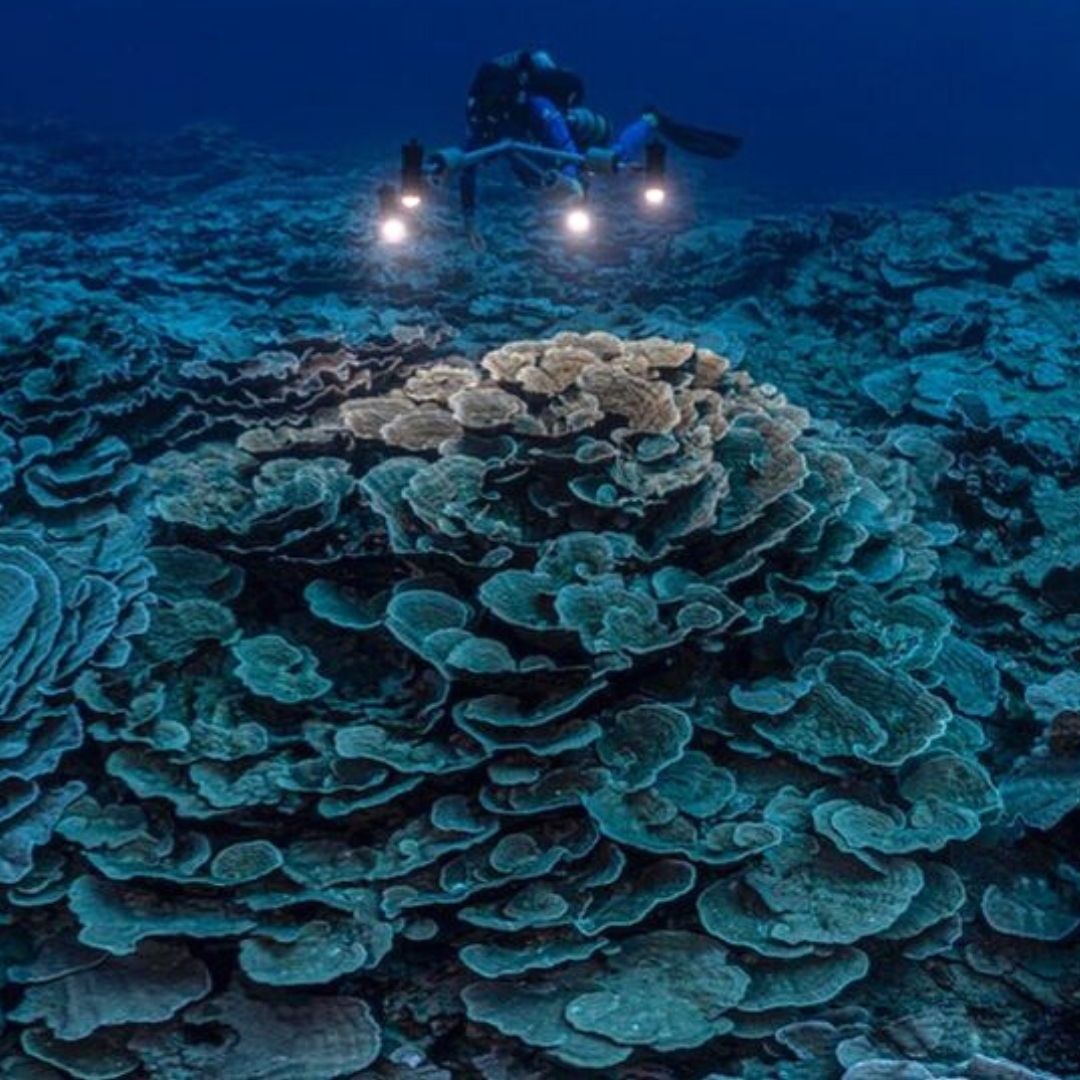A new coral reef has been discovered off the coast of Tahiti! Stretching for more than three kilometres, UNESCO says it’s one of the largest coral reefs in the world.


Photograph: Alexis Rosenfeld
Large, Rose-Shaped Corals Discovered In Deeper Waters
One of the largest coral reefs in the world has just been discovered by a team of divers off the coast of Tahiti. The previously-undiscovered reef — featuring large, rose-shaped corals — was found more than 30 metres below the water’s surface. This depth is typically known as the ocean’s “twilight zone”, which is largely unexplored and unmapped.
According to French photographer Alexis Rosenfeld, "it was magical to witness giant, beautiful rose corals which stretch for as far as the eye can see. It was like a work of art”. Rosenfeld led the team of divers who were lucky to make the discovery.
Some of the rose-shaped corals measured 2 metres in diameter, and it’s estimated that the entire reef grew over a period of 25 years!
Why Has This Coral Reef Escaped Bleaching?
The National Oceanic and Atmospheric Association found that between 2014 and 2017, around 75% of the world's coral experienced severe heat stress and bleaching. Plus, a UN-backed report found that between 2009-2018, the consistent rise in sea temperature decimated around 14% of the world’s coral reefs.
So, why does this newly-discovered reef have no signs of coral bleaching? According to the experts, it’s likely due to the reef being located in deeper, cooler waters — away from sunlight.
"We still associate corals with the shallowest tropical seas, but here we find a huge previously unknown coral reef system,” said Professor Murray Roberts, marine scientist. "As shallow waters warm faster than the deeper waters, we may find these deeper reef systems are refuges for corals in the future."


Photograph:Alexis Rosenfeld
We Know More About The Moon Than The Ocean, Experts Say
This remarkable discovery suggests that there could be many undiscovered coral reefs in the ocean’s “twilight zone”, which is around 30-120 metres below the surface. Here, there is just enough light for corals to grow and reproduce.
The divers who discovered the reef back in November 2021 were actually part of the Seabed2030 Project; a global seabed-mapping mission which aims to uncover what lies beneath the ocean’s shallow waters. Experts say that more of the ocean floor needs to be mapped to protect marine ecosystems. “We know more about the surface of the moon or the surface of Mars than the deeper part of the ocean,” said UNESCO's head of marine policy, Julian Barbiere. This is because currently, only around 20% of the entire seabed is mapped.


Photograph: Alexis Rosenfeld
Deeper Reefs May Be More Resilient To Climate Change
We know that coral reefs are quite resilient, but when they’re routinely faced with ongoing threats like heat stress and bleaching, extreme weather events, and degrading water quality — the corals aren’t given enough time to recover.
However, coral reefs that are found deeper in the ocean may not be subjected to the same stressors that degrade coral reefs in shallow waters, like severe heat stress and pollution. This new coral reef found in Tahitian waters may point to a new way for corals to thrive — in deeper, cooler waters with less sunlight. According to Dr Laetitia Hedouin, from France's National Centre of Scientific Research, “we think that deeper reefs may be better protected from global warming — so the discovery of this reef in such a pristine condition is good news, and can inspire future conservation".
Who knows how many pristine coral reefs exist in the “twilight zone”? Whilst the discovery of this coral reef is fantastic news, it does not diminish the threat of climate change upon our Great Barrier Reef. In the future, if we want to swim in shallow waters with bright, colourful coral — global emissions need to be slashed this decade to give coral reefs a fighting chance of survival.
Head to our Eco News category to read about more amazing discoveries just like this!
Charles Darwin’s 150+ Year Old Discovery May Help To Combat Climate Change
Successful Coral Spawning Event Brings New Hope For The Great Barrier Reef
‘Real-Life’ Spongebob Squarepants & Patrick Star Spotted On Seafloor Expedition!


